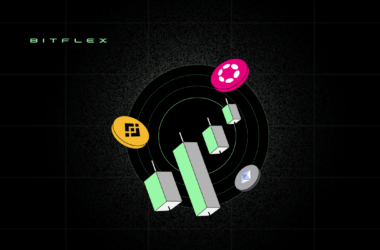Catalogue - Key Takeaways Show

Blockchain Technology: A Boom for Green Agenda?
Blockchain technology is associated with cryptocurrencies, carries the potential to revolutionize various industries. But can this ledger system also contribute to a greener future? As these concerns surface up regarding the energy consumption, blockchain technology also offers unique advantages that can positively impact the environment. Let us delve into how the blockchain technology can be a great tool for environmental sustainability. In the recent years, technology and sustainability has garnered significant attention amid climate change, and environmental degradation continues to escalate. Amidst this backdrop, blockchain technology has come up as a promising tool with the potential to revolutionize multiple industries. Despite its energy intensive processes such as cryptocurrency mining process, blockchain technology possesses several features that can contribute to sustainability efforts. From enhancing supply chain transparency to enabling renewable energy trading the positive impacts of blockchains on the environment are multifaceted and far reaching.
Transparency and Traceability for Sustainable Supply Chain
A biggest challenge in ensuring the environmental responsibility is maintenance of transparency in supply chain. Often times, it is difficult to track the origin and journey of materials, making it hard to identify the unsustainable practices like deforestation or unethical mining. Blockchain’s secure and immutable ledger system can address this.
You can imagine a system where every step of a product’s journey, from raw material extraction to finished goods, is recorded on a blockchain. This allows the consumer to verify the product’s origin and ensure it aligns with their sustainability values. For instance, a piece of furniture can have blockchain record that tracks the wood used, verifying it came from a responsibly managed forest. This empowers the consumers to make choices and incentivize businesses and adopt sustainable practices.
Additionally, blockchain can also promote fair trade practices. By recording information about labor conditions and wages at each stage of the supply chain, it can also ensure fair treatment of workers that are involved in resource extraction and production. This fosters a more ethical and sustainable global marketplace.
Empowering Renewable Energy and Peer-to Peer Trading
With the rise of renewable energy sources such as wind and solar power that are crucial for combating the rising climate change. However, the integration of traditional energy grids can be complex. Blockchain offers a solution with peer-to-peer energy trading.
Imagine that a neighborhood where homes with solar panels can sell energy directly to their neighbors through a blockchain platform. This eliminates the need for a centralized grid management and empowers individuals to participate in the energy market. Blockchain systems can securely track the energy production and consumption, enabling transparent and immutable ledger, enabling transparent and efficient peer to peer transactions. This further promotes the adoption of renewables energy sources and fosters a more distributed and sustainable energy ecosystem.
Waste Management Streamlining and Circular Economy Promotion
Waste Management is a major environmental concern. Blockchain can revolutionize waste management by creating a transparent and accountable system. Imagine a system where the waste disposal is tracked on a blockchain ensuring proper recycling and reducing the chances of illegal dumping.
Furthermore, the blockchain can facilitate and circular economy where products are designed for reuse and repair. By recording product history and maintenance of records on a blockchain, businesses can promote the reuse and refurbishment of products instead of constantly producing new ones. This reduces the resource consumption and minimize waste generation.
Facilitation of Carbon Credit Trading and Environmental Initiatives
Combating the climate change requires a global effort to reduce the carbon emissions. Carbon credits are a tool used to incentivize reduction. Here again we can use the blockchain can help to play a key role.
By creating a secure and transparent platform for carbon credit rating, blockchain can ensure the legitimacy and effectiveness of these programs. It can track the issuance, ownership and exchange of carbon credits, and thus prevents frauds and ensures that credits contribute to verified emission and reduction projects. This facilitates efficient carbon trading and promote investment in environmental initiatives.
Mitigating the Environmental Impact of Blockchain
It is important to acknowledge the blockchain technology itself has an environmental footprint due to the energy consumption required for certain consensus mechanisms, especially Proof of Work (PoW) used in popular blockchain networks. However there are some advancements that are being made to address this concern.
The development of alternatives consensus mechanisms such as Proof-of-Stake (PoS) significantly reducing the energy consumption. Additionally, this transition towards renewable energy sources to power blockchain operations can further minimize the environmental impact.
The Road to Balance Innovation and Sustainability
As blockchain holds immense potential for environmental good, its development and implementation must be done responsibly. Here are some key considerations:
- Energy Consumption: The mainstream industry needs to adopt energy efficient consensus mechanisms and explore renewable energy resources for blockchain operations.
- Regulations and Standards: Developing the clear regulations and standards for blockchain applications in the environmental sector can ensure transparency and promote responsible practices.
- Collaboration: Collaboration between governments, environmental organizations and businesses is crucial to check out the full potential of blockchain technology.
Conclusion
In summary, blockchain technology presents a unique opportunity to address some of the most pressing environmental challenges. By promoting transparency, accountability, and traceability, blockchain can empower individuals and businesses to make environmentally conscious decisions. Through ongoing innovation and responsible development, blockchain can become a powerful tool for building a greener future.
FAQs
What are the Biggest Impacts of Blockchain?
Blockchain’s biggest impact lies in enhancing transparency, traceability, and security across various industries.
How does blockchain impact society?
Blockchain networks disrupted traditional trust models by enabling secure, transparent and decentralized interactions.
What are the positive implications of blockchain?
Blockchains provide increased trust, efficiency, and security in areas like supply chains, energy, and record keeping.
About BITFLEX
BITFLEX is a cryptocurrency exchange platform that offers traders a secure, easy-to-use, and convenient way to buy, sell and trade cryptocurrencies. Our platform has been designed with investors of all levels in mind, whether they are just starting out or experienced traders. We offer various features and tools to help users make the best trading decisions possible, including advanced charting and analytics, real-time market data, and various customizable trading interfaces. At BITFLEX, we are dedicated to empowering our users and helping them reach their financial goals.
Stay in the loop about our launches, trading pair announcements, contests and more by following us on Discord, Telegram, and Twitter.









